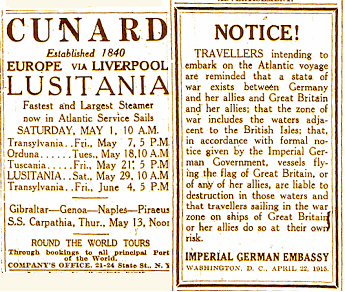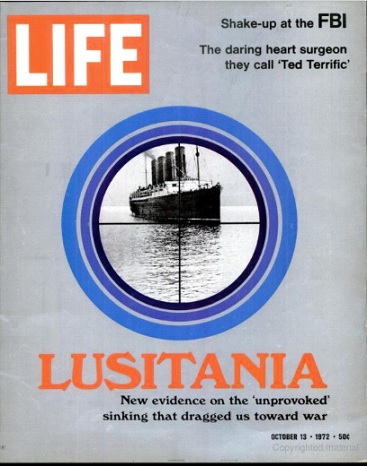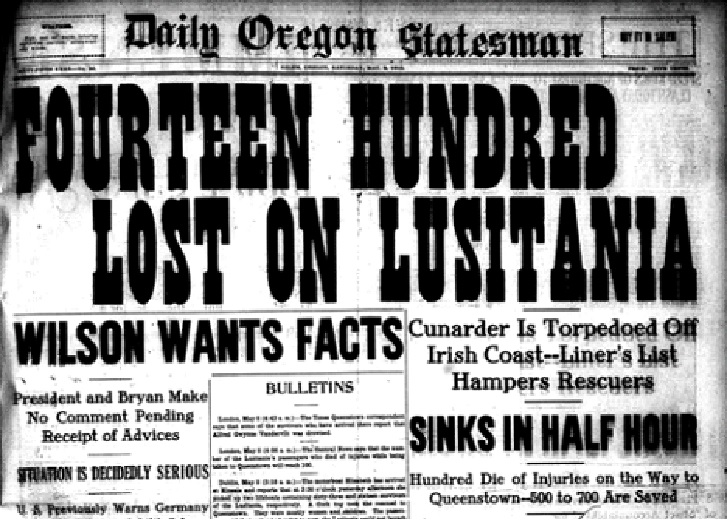by Richard van Pelt, WWI Correspondent
The Oregon Statesman again published a banner headline:
The scope of the sinking of the Lusitania quickly became apparent, as did the scale of the death toll. The Germans responded that the ship was carrying munitions and that American passengers were aboard to serve as shield for the cargo. The United States quickly demanded a response from the German government and promised to hold Germany strictly accountable.
1346 PERISHED WHEN HUGE LINER WENT DOWN
GREAT LOSS OF LIFE DUE TO GERMANS’ FAILURE TO GIVE ANY WARNING
Passengers At Luncheon Were Startled By Terrific Explosion and Rush For Boats Began – Survivors Suffer From Exposure and Many Die After Reaching Shore – Only Ten Boats Could Be Launched Before Liner Sunk
LUSITANIA CARRIED MUNITIONS OF WAR, SAYS DR. DERNBURG
Charges That American Passengers Were Carried As A Shield For Cargo
UNITED STATES ASKS GERMANS FOR FULL REPORT OF DISASTER
Authorities Hold That Germans Will Have Good Legal Defense For Deed
GERMANS WILL BE HELD STRICTLY ACCOUNTABLE
The Oregon Statesman reported the attack:
The Lusitania was steaming along about ten miles off Old Head Kindle on the last leg of her voyage to Liverpool, when about 2 o’clock in the afternoon a submarine suddenly appeared, and so far as all reports go, fired two torpedoes, without warning, at the steamer. One struck near the bows, and the other in the engine room. The powerful agents of destruction tore through the vessel’s side causing terrific explosions. Almost immediately a great volume of water poured through the openings and the Lusitania listed.
Boats, which were already swung out on the davits, were dropped overboard and were speedily filled with passengers, who had been appalled by the desperate attack. A wireless call for help was sent out and immediately rescue boats of all kinds were sent out both from the neighboring points along the coast and Queeenstown.
But within fifteen minutes, as one survivor estimated, and certainly within half an hour, the Lusitania had disappeared.
The issue of whether the Lusitania was an armed vessel carrying contraband will dominate the news over the next month. The German government argued that travelers had been warned and that the vessel was in fact carrying arms and ammunition.
 “Lusitania Armed,” the Statesman reported, citing reports and editorials in the London Morning Post. The London paper remarked on the elaborate warnings posted in New York papers prior to the ship’s fatal voyage:
“Lusitania Armed,” the Statesman reported, citing reports and editorials in the London Morning Post. The London paper remarked on the elaborate warnings posted in New York papers prior to the ship’s fatal voyage:
We find it difficult to understand how, with such warnings and such ample opportunities to take all precautions, the Lusitania was caught. The conclusion that the vessel’s exact course must have been known to the captain of the submarine is difficult to avoid, but uncomfortable to accept.
The London paper – and by extension the Salem papers – questioned possible bureaucratic “niceties” that may have contributed to her sinking:
But it appears that New York legal niceties regarding armaments prevented the boat carrying ammunition for those guns on pain of being interned in a neutral port as a ship of war.
But surely if the United States regards these submarine attacks as illegal, it should follow that guns may be used on merchantmen to guard themselves against such attacks without making the vessel which uses them a ship of war.
In the face of this crime, it is idle to waste words in condemnation. We must set our teeth and go on with the war with more courage and determination.
The sinking had a local, Oregon, connection. Among the survivors was one Dorothy Conner:
MEDFORD GIRL ON THE LUSITANIA
Miss Dorothy Conner on Way to Join Red Cross Unit in Belgium – Barely Catches Steamer
Medford, Or., May 7 – Miss Dorothy Conner, daughter of Mrs. Charles Conner, wealthy ranch owner in the Rogue river valley, was a passenger on the Lusitania. She left Medford about two weeks ago and a letter from her was received here today in which she said that she only had two hours in which to catch the boat.
 The initial reports implied the ship was armed. We will be reporting how the sinking was invested and official conclusion from the time, emphasizing the evidence available to readers in 1915. Readers of a certain age may remember Life Magazine. In In 1972 Life did a long report on the sinking, publishing excerpts from a soon to be publish book by Colin Simpson titled “Lusitania.”
The initial reports implied the ship was armed. We will be reporting how the sinking was invested and official conclusion from the time, emphasizing the evidence available to readers in 1915. Readers of a certain age may remember Life Magazine. In In 1972 Life did a long report on the sinking, publishing excerpts from a soon to be publish book by Colin Simpson titled “Lusitania.”
No images exist of the sinking of the Lusitania. In 1918, the cartoonist Winsor McCay produced an animated film of the sinking of the Lusitania, which may be viewed here.
The Oregon Statesman commented editorially on the appropriate relationship between military and civilians with respect to spending:
THE WEDGE OF MILITARISM
George von L. Meyer, former secretary of the navy, is much disturbed because congress is not willing, and has never been willing, to make a big lump appropriation for the navy department to spend as it sees fit, under the direction of a navy board.
If we were to give the navy experts all the money they want and let them spend it as they please, we would naturally have to do the same thing with the army experts. That would mean opening the treasury the United States to professional fighters and giving free rein to militarism. We should no doubt have a stronger and better army and navy, but at what a cost!
The editor explains our long tradition of keeping the military under civilian control and concludes:
Ever since the birth of the nation we have feared to let the army and navy get the upper hand in government. The present European war has vindicated us with startling completeness. The policy that Mr. Meyer and other malcontents are urging is the policy that has been followed in Germany, France, Austria and Russia – with what results, the world sees. It isn’t likely that now or hereafter the professional fighters and jingo will succeed in driving into our institutions the entering wedge of militarism.
The Oregon Statesman also addressed the issue of war and demographics:
FRENCH COFFINS AND CRADLES
One of the interesting problems of the war is, what will be the effect on the population of France – the great “race suicide” nation?
In the last eight years there has been more demand for coffins than cradles in France. The vital statistics report for the first half of 1914, just published, shows that during that time the deaths exceeded the births by about 3000 a month. At that rate, experts estimate, the population of any French community would be extinguished in 125 years.
The situation is due apparently, not to racial decay but to established social policy. The French have simply adopted the custom of having only two children to a family, as a means of maintaining their social and economic conditions.








Leave A Comment